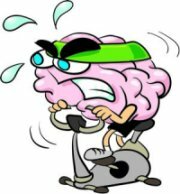 So we’ve read it in many studies: Physical exercise is important and contributes to a healthy life style. It has also been shown to be essential for cognitive health, helping us not only to remain physically fit but also to maintain mental sharpness.
So we’ve read it in many studies: Physical exercise is important and contributes to a healthy life style. It has also been shown to be essential for cognitive health, helping us not only to remain physically fit but also to maintain mental sharpness.
Today, however, researchers find that it is not enough to inform people. This solely informative approach is not sufficient and motivating enough to get people to change their life styles accordingly and become more active.
In order to change behaviors it is now essential to also offer strategies, as the researchers from MU Sinclair School of Nursing found.
When it comes to cognitive fitness, the HAPPYneuron program can be considered as a brain training strategy in itself. It provides you with a coach on which you can rely to prepare your training sessions, depending on what type of training you have asked for or even the length you have chosen. You also have the opportunity to set training reminders for yourself via email in order to not forget your sessions.
There are many other ways to improve and keep up your cognitive fitness habits.
In addition to our training reminders, you can also:
- plan your week ahead and write “training slots” in your diary,
- start by setting yourself short sessions and stick with the strict minimum advised (2-3 sessions a week, at least 20 minutes each) if you think you don’t have the time, then slowly increasing session duration etc…
- get friends and family involved to make your HAPPYneuron something to share with people, a conversation topic
- when feeling less motivated, choose those games you like best rather than do a session chosen by the coach
On top of HAPPYneuron, you can also start with little training exercises such as:
- memorizing phone numbers rather than writing them down
- trying to do your shopping without a list
- asking yourself random questions such as “What was I wearing last Thursday?” or “What did we have for dinner on Monday night?”
Can you think of any more strategies to train your brain?